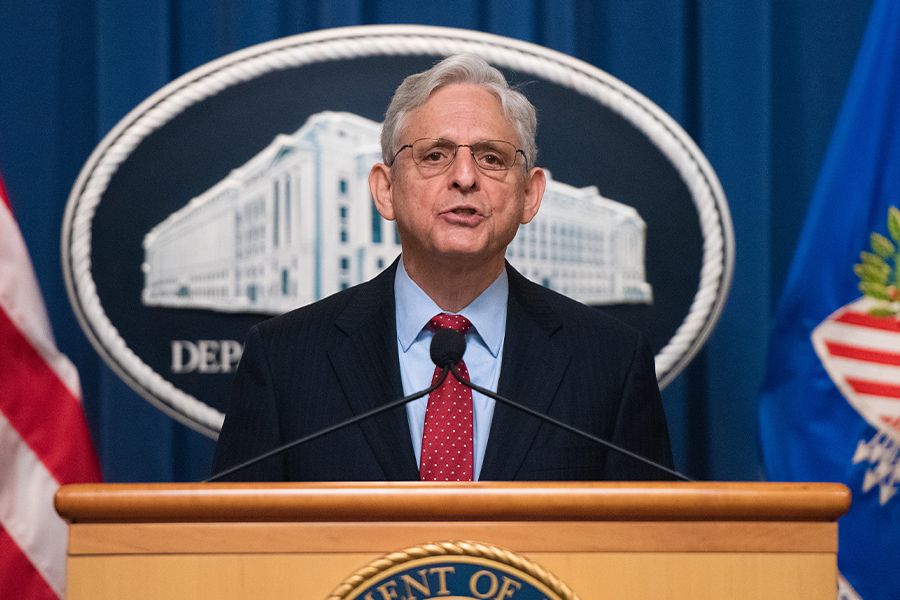Attorney General Merrick Garland pledges to ensure access to abortion services
The nation’s top law enforcement official vowed to protect those seeking abortions in states where it is legal. He also pledged to work with the FDA and other agencies to ensure people get reproductive care.
Attorney General Merrick Garland denounced the Supreme Court ruling striking down abortion rights nationwide and pledged the Justice Department will do its part to ensure women have safe access to healthcare.
“The Justice Department strongly disagrees with the Court’s decision,” Garland said in a statement. “This decision deals a devastating blow to reproductive freedom in the United States. It will have an immediate and irreversible impact on the lives of people across the country.”
U.S. Attorney General Merrick Garland (Photo courtesy of U.S. Justice Department)

Garland said he would work to protect the rights of those seeking abortion in states where abortion remains legal.
“We recognize that traveling to obtain reproductive care may not be feasible in many circumstances,” Garland said in the statement. “But under bedrock constitutional principles, women who reside in states that have banned access to comprehensive reproductive care must remain free to seek that care in states where it is legal.
"Moreover, under fundamental First Amendment principles, individuals must remain free to inform and counsel each other about the reproductive care that is available in other states.”
- Related story: Supreme Court upends Roe v. Wade, and medical colleges weigh impact on training doctors
- Related story: After Supreme Court overturns Roe v. Wade, health groups warn lives are at risk
Some governors are making it clear they will welcome those coming from other states to obtain abortion services.
Massachusetts Gov. Charlie Baker signed an executive order Friday that would protect healthcare providers who perform abortions on women from other states.
"The Commonwealth has long been a leader in protecting a woman’s right to choose and access to reproductive health services, while other states have criminalized or otherwise restricted access,” Baker said. “This executive order will further preserve that right and protect reproductive health care providers who serve out of state residents."
Pennsylvania Gov. Tom Wolf said Friday, "I want every Pennsylvanian to know abortion services are available and unharmed by today’s ruling. To women and pregnant people in surrounding states and across the country where this isn’t the case: You are safe here."
After the Roe v. Wade decision nearly 50 years ago, the Supreme Court issued a ruling Friday saying there’s no constitutional right to an abortion. The 6-3 decision, which followed the court’s ideological leanings, leaves the question of abortion access to the individual states.
Some states have passed trigger laws that went into effect within hours of the ruling, while other states are expected to enact laws outlawing most abortion services within the coming week.
In his statement Friday, Garland pointed out that states prohibitng abortion within their own borders cannot bar women from obtaining abortion services in other states.
“Today’s decision does not eliminate the ability of states to keep abortion legal within their borders,” Garland said in a statement. “And the Constitution continues to restrict states’ authority to ban reproductive services provided outside their borders.”
Health advocates, and Garland himself, noted that isn’t an option for many women who can’t afford to travel hundreds of miles to obtain an abortion, including a disproportionate number of women in minority groups.
The nation’s top law enforcement official also said he’d be working with federal agencies, including the Food and Drug Administration, to ensure women have access to healthcare.
“We stand ready to work with other arms of the federal government that seek to use their lawful authorities to protect and preserve access to reproductive care,” Garland said. “In particular, the FDA has approved the use of the medication Mifepristone. States may not ban Mifepristone based on disagreement with the FDA’s expert judgment about its safety and efficacy.”
Mifepristone, approved in 2000, is a pill that can be taken with another drug, misoprostol, to terminate a pregnancy within the first 70 days. Mifepristone can only be obtained with a prescription.
Federal law protects those entering clinics to obtain abortions. Garland said the Justice Department would enforce that law to protect patients and healthcare providers.
“Peacefully expressing a view is protected by the First Amendment,” Garland said. “But we must be clear that violence and threats of violence are not. The Justice Department will not tolerate such acts.”
“Under the Freedom of Access to Clinic Entrances Act, the Department will continue to protect healthcare providers and individuals seeking reproductive health services in states where those services remain legal. This law prohibits anyone from obstructing access to reproductive health services through violence, threats of violence, or property damage,” Garland said in his statement.
President Biden said Friday, "I call on everyone, no matter how deeply they care about the decision, to keep all protests peaceful."
Federal agencies can provide reproductive health services to the extent allowed by federal law, the attorney general said. “And federal employees who carry out their duties by providing such services must be allowed to do so free from the threat of liability,” Garland said.
Agencies with questions about their ability to provide reproductive health services should contact the Justice Department, he said.